#Coreander's Old Books
Text
As a recovering reader myself, I am here to remind you that if you want to read more but are struggling, you have full permission to do any and all of the following:
Read the ending first, or look up the big spoilers.
Read a summary first, or scene by scene.
Skip around passages/come back to them when you're more ready
Watch the movie/read the graphic novel/look at the fanart first to pique your interest
Write/draw/highlight/scrapbook in the book itself (YOU ARE ALLOWED, assuming the book is yours! THIS MAKES IT A LOVED BOOK! You can also tip in pages specifically for this if you want more room - literally run some glue along the edge of a piece of paper, wedge it as deep as you can between two open pages, close the book and let it dry for a couple of minutes, and voila! Blank pages! I promise you ,you will not accidentally glue your book shut.)
Take the book up again even if it's been "too long" and guilt is telling you that you need to start over for some reason.
Listen to audiobooks only - it's real reading!! Reading is absorbing the words the author wrote, whether through a page recreated by a printing press or a page recreated by the sounds of a human voice!
Speed up or slow down the audiobook
Read at your own speed without regard to challenges or comparison
Use a device
Read the words out loud or under your breath
Have fifteen books on the go at once, or just one
Give up on a book that's not working for you at all, and find a fresh one that works better
Never track your reading
Track your reading meticulously and become addicted to your stats
Make reading more social by reading aloud to someone else, blogging your reading, obnoxiously talking your friend's ear off - whatever you like!
And yes, you can also keep your experience spoiler free, read straight through, keep your book in pristine condition, track your stats meticulously etc. etc.! Those are wonderful too. The point is, don't sabotage your reading with "shoulds," be gentle with yourself, and set yourself up to enjoy it. I'm three years into my recovering reader project, and I still have to be gentle with myself about habits I want to embrace but am not quite there yet.
#recovering reader#coreander's old books#Some of these I have done and others are just things I think it might be useful to consider#reading#books
92 notes
·
View notes
Text
The Neverending Story, Introduction
(Curious what I'm doing here? Read this post! For the link index and a primer on The Neverending Story, read this one!)
In which we set our scene.
A picture of a sign on a shop's front door which reads "Carl Conrad Coreander / Old Books". It's a rainy November morning,(1) when the door opens violently, tinkling the bells above it.(2) A fat little boy(3) of perhaps age ten or twelve is soaked through from the rain. When he notices that he's in a bookshop, he seems to become overwhelmed.
A puff of smoke rises and then dissipates from further in, and the narration draws attention to the resemblance to smoke signals.(4) A voice tells the boy to close the door, whether he's staying or going, and the boy does so, then peeks around the bookcase hiding the speaker. He ends up being a "short, stout man" in a leather wingback chair.(5)
The man, seeing the child, says he cannot abide children, they're good for nothing to him.(6) The child says not all children are like that, and the man raises his eyebrows and asks if he's the great exception. The child shrugs and make to leave, but the man says he's rather impolite, not introducing himself. They exchange names: the boy is Bastian Balthazar Bux, and the old man is Carl Conrad Coreander.(7)
Mr Coreander asks why young Mr Bux came into the shop in such a hurry. Bastian says he was running away from some other children who were bullying him. Bastian's incapable of doing anything to make them stop,(8) he's not physically or mentally very strong. When Bastian says one of the names the children call him, at Mr Coreander's prompting, Corander asks why they use that word, and Bastian says he makes up stories and names for things and says them aloud to himself sometimes. Mr Coreander looks thoughtful and asks what Bastian's parents think. His father doesn't say anything, and his mother is dead.
Just then, the phone rings, and Mr Coreander reluctantly goes to answer it. It's a very long conversation, and at one point Bastian's name is said.
Bastian just looks at the book Mr Coreander had been holding, which holds a sort of magnetism for him. He walks over, and touches the cover, and it's as if something clicks inside him.
Bastian had a vague feeling that touching the book had started something irrevocable, which would now take its course.
Bastian picks up the book and examines it. It's titled
The Neverending Story
Human passions have mysterious ways, in children as well as grown-ups. Those affected by them can't explain them, and those who haven't known them have no understanding of them at all. [...] In short, there are as many different passions as there are people.
Bastian Balthazar Bux's passion was books.(9)
If you've never loved books as Bastian did, you may not understand what he does next. This book feels like everything he's ever dreamed of, he must have it, at whatever price. But, knowing that he has no money to pay Mr Coreander for it, Bastian… steals it. Tucks it into his coat, opens the door only just enough to slip through so the bell doesn't ring.
Outside, he starts running, getting soaked in the rain as his conscience flares to life and starts telling him off for stealing what's obviously a very rare book, "surely Mr Coreander's greatest treasure."
Still, he holds tight to it as he runs, with no particular destination yet, because he obviously can't go home. His father can't find out that he's become a thief, and if Bastian runs away, his father might never even notice that he's gone.
Bastian slows when he realizes his feet have taken him on his usual route to school without his input. The place seems dead, with everyone already in their classrooms. Bastian shuffles through the halls until he realizes there is a place here where no one will go looking for him for quite some time: the attic. Bastian turns the key in the lock, opens and closes the squeaky door, closes it, locks it behind him. Even if someone comes, they'll have to contend with the missing key from the janitor's cupboard(10) and he'll have time to hide.(11)
Soon, he adjusts to the dim light, and he starts to feel cold from his wet coat. It occurs to him that he'll be here a long time, but not that he might feel hungry or thirsty. The space is filled with junk, the discards of schoolyears past. He finds some gym mats to stretch out on, and takes off his wet coat and shoes.
He looks at the book, thinking how his class would have history about now. He wonders what's in a book when it's not open.(12) An "almost festive mood" takes him, and he settles and starts reading.
=====
(1) I'm writing this on one of the hottest days of the year so far here, so, not exactly the same mood. Also, it feels worth noting here that all Bastian's-world text is in italics in my paperback, here and in the regular chapters. It's an effective way to separate the layers.
(2) I love old shops that have these. Conversely, I hate Discord servers with welcome messages. It's one thing to say "you have a customer and they might have needs" and quite another to say "We see you whether you want to be perceived or not" (since people go into shops to browse and buy, and people join Discord servers for many reasons including to check the vibes before they start talking.) This is in no way relevant to the book, just the way my brain works.
(3) You know, I think this bit especially gets lost in a lot of people's minds across time, particularly because the film cast a straight-size lad in the role.
(4) I'm not calling them what the book does because it's quite beside the point, smoke signals were used the world over. However, I've long since come to terms with Europe having a very strange understanding of First Nations/Native American cultures.
(5) I'm sure the rest of the description is supposed to convey quite a lot of things to the reader, but I don't form mental images, I don't typically remember visual information, so a lot of this sort of thing I'm really clueless on. What do you think of the descriptions of Bastian and Mr. Coreander? Besides the statement of "suggested a vicious bulldog", I haven't any impressions at all.
(6) It's unfortunate that it's still acceptable to say this sort of thing to children even today, forty years on. Children don't deserve to have to deal with your baggage, even if you really do despise them and they don't just make you uncomfortable for other reasons. Feel your feelings, but choose your actions wisely and kindly. (I don't seek out the company of children, and being responsible for them gives me stress breakouts, but the kids don't deserve to feel uncared-for because of my hangups.)
(7) Do you feel like alliteration is going to be a part of the story? Or is this just a seeming coincidence to tie these two characters' fates together? I wonder if there was more alliteration in the original German.
(8) Coreander seems reluctant to believe that Bastian is so helpless, but Bastian's story indicates, to me at least, that Ende had endured some of the sort of bullying that nothing seems to fix, and the way Coreander reacts rings true to my experience with most adults including school admin. I got into more trouble than my bullies/abusers ever did.
(9) World's biggest mood for me.
(10) The order in which things are revealed in the book maximizes the sense of mystery and floaty fantasy, but isn't all that great for those of us who don't remember every detail from previous readings and start making our assumptions at the first hint, not realizing there's a reveal literally on the facing page because we don't read ahead. (Which is to say, I had a whole nother comment here until this literally just happened to me, gosh dangit.)
(11) Good old child logic. It's a finite space, Bastian, they'll still find you.
(12) Schrodinger! (shakes fist at the sky)
2 notes
·
View notes
Text
The inevitable follow up to my last post, the Good Omens/The Neverending Story fusion:
Warlock as Bastian Balthazar Bux
Adam as Atreyu
Aziraphale as Carl Conrad Coreander (the grumpy bookseller)
Crowley as Falkor the luckdragon (book!Crowley is an optimist. Also dragon, snake, shut up it works)
Madame Tracy and Shadwell as Urgl and Engywook, the old gnome couple
Brian, Wensleydale, and Pepper as Rockbiter, Nighthob, and Teeny Weeny respectively
Gmork (wolf dude) can shift between War, Famine, and Pollution (not Death though; we’ll get to him in a second)
God as the Childlike Empress. This isn’t so much a fusion as it is just an observation of how Fantasia/Fantastica works, honestly
Death as Old Man of Wandering Mountain (read the book, you heathen)(in the book (spoilers), after Atreyu returns to the Childlike Empress believing he failed, Bastian still doesn’t say anything. So the Childlike Empress puts him and Falkor someplace safe to rest (more on that in a minute) and goes to find Old Man of Wandering Mountain. He writes down everything that happens in Fantasica in a book. Aha, says clever you, he’s writing The Neverending Story book Bastian is reading. False. He is writing The Neverending Story book we are reading, complete with the parts about Bastian. The Childlike Empress makes him start rereading what he’s written, trapping them in an eternal loop until Bastian finally says her name.)(This also isn’t so much a fusion as it is just an observation of how Fantastica works)
Remember that safe place I mentioned? So it turns out the AURYN, the Childlike Empress’ pendent, is also a place, the one that exists at the border of Fantastica and the real world (and it has the Water of Life, but that’s besides the point at the moment). Inside are the two snakes on the pendent, a white one and a black one. And, plot twist (that I just made up and has no basis in canon), the snakes are also Aziraphale and Crowley. While they are always in the pendent, they are simultaneously capable of leaving and taking on other forms to nudge things along. Aziraphale can go to the real world and Crowley can go to Fantastica. Did I just make this plot twist up for no other reason than ensuring my OTP can still be together? Yes. Absolutely. Why is that even a question?
#good omens#the neverending story#fanfiction#fic idea#fandom fusion#more stuff i will never write#and this time i mean it#azcrow#ineffable husbands
12 notes
·
View notes
Photo
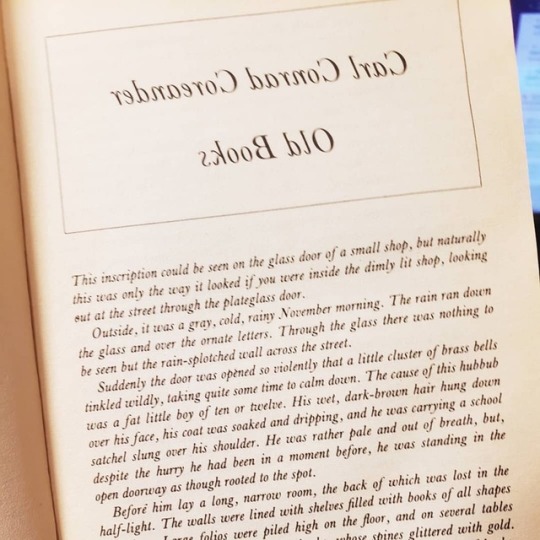
"Carl Conrad Coreander - Old Books" This reminds me of Bouland Brothers Booksellers where I purchased this book. I miss this store every day, it was truly a hidden treasure. I didn't purchase nearly enough books nor did I read enough in my youth, but I plan on making time for both going forward. Onward to adventure! 📖 https://www.instagram.com/p/Br8lgDpnJTn/?utm_source=ig_tumblr_share&igshid=1wmdirr2cnjtc
3 notes
·
View notes
Text
Ex Bibliotheca Lucis
Day 7 of @gladiofluff - Books
When an eight year old Gladio hides in the Grand Library to escape the wooden spoon of the head cook, little does he realize that he's about to meet a man who will change his life, and instill in him a love for reading.
Read it here on AO3 if you prefer: https://archiveofourown.org/works/14842086
***
At the tender age of eight, Gladiolus Amicitia had certainly been in his fair share of trouble. Defending the Prince and his tutor from bullies; having a precocious curiosity. Both had found him with his ear tweaked, doing laps, writing lines, and even being spanked more times than he could count. The Shields of Lucis were held to high standards.
So, it was with little surprise when Gladio found himself running through the halls of the Citadel, trying to avoid the broad side of the head cook's wooden spoon. Gladio had been caught taste-testing the pies lining a stretch of counter by sticking his fingers in them. All ten of them. He had long legs for his age, but not long enough to completely outrun the woman.
Rounding a corner, Gladio smacked right into Noctis' tutor, Ignis, and sent the younger boy sprawling. The papers he was carrying looked like giant pieces of confetti as they flew into the air and came fluttering down to the ground.
"Astrals! Sorry, Iggy!" Gladio muttered as he hurried to his feet and helped the other boy up. Ignis didn't appear to be any worse for wear, other than looking suddenly out of sorts.
"Iggy?" The younger boy said, of all things, as he straightened his glasses with a single finger and a slight blush dusting his cheeks.
Gladio tried smoothing Ignis' vest and hair down before he stooped to gather up his papers. "I'm so sorry, but I gotta go." Shoving the papers back into Ignis' arms, the bespectacled boy still dazedly repeated 'Iggy' as though testing the way it rolled from his tongue.
Gladio looked around for where the small boy had come from. The large ornate wooden doors of the CItadel's Grand Library leapt into view just as Gladio could hear the head cook approaching.
"Cover for me!" Gladio yelled behind him to Ignis as he pushed one of the heavy doors open and slipped inside. Gladio stood with his back leaning against the heavy door, suddenly out of breath and jittery from the adrenaline rush. That was close. Before he could completely catch his breath, a voice broke through the quiet, heavy hush of the room.
"Ignis my boy, did you--"
A thin reed of a man leaned over the counter to peer at Gladiolus from behind the massive mahogany counter. He had a pair of rectangular reading glasses perched on the end of his nose, and a moustache so bushy it almost covered his entire mouth. Gladio idly wondered how the man managed to eat when he spoke again, filtered through a thousand bristly grey hairs.
"You aren't Ignis," he said simply.
Gladio looked around, wondering if he'd made a terrible mistake. He wasn't a bookworm, he only read what was required for school. What if this man turned him over to the head cook without a second thought? Gladio shriveled slightly against the door under the man's scrutiny. Equally bushy eyebrows raised as if in question, and Gladio stuttered a respectable response.
"N-no, sir. I'm Gladiolous, Mr. Cor..." Gladio's voice trailed off as he struggled to pronounce the name on the engraved placard sitting on the counter.
The librarian's face softened into that of a wise old owl as he took in Gladio's flushed appearance, quick breaths, and the way he had hastened into the library.
"Ah, young Master Amicitia, I presume? I am not the Marshal, with whom I am sure you are quite familiar. I am Mister Coreander, and I look after the Grand Library," he said with a fluorish of his arm.
Bright amber eyes, wide open and curious, followed the gesture. Gladio's jaw dropped as his gaze flicked around what he could see of the room. Plush carpets covered the floor, massive wooden bookshelves lined every wall from the floor to the vaulted ceiling nearly three stories above his head. Grand arched windows were all that broke up the rows of books. Stained glass was in every other window, depicting the great Kings of Lucis.
The librarian watched Gladio's reaction, a slow smile spreading across his face. Librum Coreander knew a young mind that begged to be expanded when he saw one. He stepped out from behind the counter, and gestured for Gladio to follow him.
In addition to the floor to ceiling units, the center of the enormous room was also filled with towering shelves, all arranged neatly and categorized for ease of use. Dotting the area were thick tables capable of holding mounds of books, arm chairs, lamps, carts, and of course people of all ages.
"Tell me, young Master Amicitia, what kind of books do you like to read?" the librarian asked as they walked deeper into the library.
A steadying hand is all that kept Gladio from landing on his face, nearly tripping in surprise from the librarian's question. He didn't read for pleasure, and so he deflected rather than answer.
"I'm just Gladio, Mr. Coreander."
"How about M'Lord Shield then?"
"No, that's my Dad!"
"You still haven't answered my question then, Gladio."
Gladio's eyes drifted up to the great stained glass windows, and he gave the most truthful answer that he could without embarassing himself.
"I like stories about the rulers of yore," Gladio said nervously as he licked his lips, hoping the librarian wouldn't catch the real truth in his words. He did like the stories. Stories told by word of mouth, not written on the pages of a book.
"Mmm," the librarian mused. He politely overlooked the young boy's half-truth. "This way, Gladio."
The young Shield-to-be dutifully followed the librarian, not wanting to give up his pretense that he had in fact just been seeking a good place to hide when he had stumbled into the library. They finally stopped at a bookshelf filled with old dusty tomes that had clearly not been looked at in a long time. Gladio doubted very much that he would find anything of interest on them. Mr. Coreander turned to look over the tops of his rectangular spectacles, and down at Gladio. "And which of the great Kings of Lucis is your favorite?"
Gladio's face pinched in true contemplation, but he answered quickly and pressed his thumb into his chest with pride.
"Why, the Just of course. She carried a giant shield, just like I'm gonna one day."
The librarian gently lifted a very large volume from the polished wood, and gripped it tightly in his hands. He held the book close to his chest where Gladio couldn't make out the cover. Slowly he lowered the book into Gladio's outstretched hands.
A soft gasp filled the air between the young boy and the older man. Bound in dark leather, gold lettering was embossed along the top and bottom of the cover, and in the center a metal cross was embedded. The cross was equal on all sides, and looked more like the letter 'X'.
"The Justice of Knowledge..." Gladio whisperered to himself, tracing the letters with his small fingertips.
"Gladio," the librarian intoned seriously, "can I trust you with this book?"
Amber eyes looked up suddenly, and a mop of dark brown hair nodded vigorously.
"Yes of course, Mr. Coreander sir!"
Next those same small fingertips travelled along the lines of the cross.
"Mr. Coreander, what is this on the cover?"
A knowing gleam was in the librarian's eye. "That my dear boy is the symbol engraved on the shield of the Just. An amulet of sorts. If I can trust you, and you choose to read this very old book, you will learn of its origin."
"Woooow..."
Gladio opened the book enough to peek at the pages and was immediately enamored by an illustration of the Just and her shield, but he could only get a glimpse as the book was too large for him to properly open without setting it down on something.
"Back to the front then, and we'll get you a libray card made, and the book checked out in your name. Then I'll show you the perfect nook to read in here at the library..."
The multi-colored stained glass of the figure of the Just shone down on the empty place on the shelf that the Justice of Knowledge used to occupy. The warm glow travelled down the backs of the tall thin reed of a man, and the larger than average boy as their forms disappeared towards the front of the library, side by side.
Gladio clutched the large tome against his chest as though he were carrying a precious bundle, to which the librarian nodded approvingly.
"You have to be awfully strong to carry such a big book, don't you, Mr. Coreander?" Gladio asked, looking up briefly at the librarian with wide, innocent eyes.
"That you do, Gladio. That you do." He ruffled Gladio's hair, already harboring affection for the young boy. He knew most people would assume the next Shield of Lucis would be all might, just as he knew Gladio had meant strength of body. His response, however, had been in regards to the young boy's strength of mind, and character.
#gladio fluff week#gladiolus amicitia#child!gladio#books#reading#library#baby Gladnis if you squint really hard#fluff#ffxv#my writing
33 notes
·
View notes
Text
10 Things About The Neverending Story That Make No Sense
The beloved favorite 80s movie for many a Millennial child, The Neverending Story is filled with magic, adventure, and wonder. It made kids cheer, laugh, cry, and even cower in fear, which is a feat that most children's movies, save from the Toy Story franchise, have been unable to do since. Even though it's such a beloved piece of childhood for so many, that doesn't mean it's without its problems.
RELATED: MBTI® Of Neverending Story Characters
Many issues that the film has are explained away in Michael Ende's book, which was the source material the movie was very loosely based upon. But the film veers so far from his writing that as a standalone, it really often makes no sense.
10 The Nothing Isn't Nothing
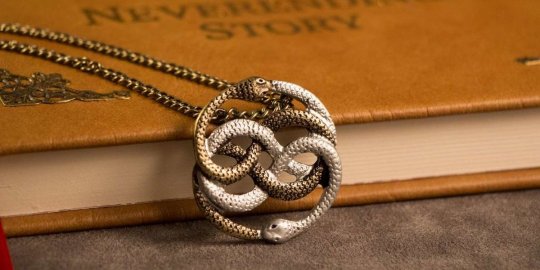
When the Nothing arrives to destroy everything in its path, it certainly isn't nothing. It's a bunch of dark clouds, fierce winds and chaos. It's more like a spring day in a Midwestern town in Tornado Alley than "nothing." When it arrives, Atreyu has to hold onto things before he's swept away into it.
RELATED: 10 Things That Make No Sense About A Star Is Born
The Nothing leaves nothing, or nearly nothing, behind following its destructive path, which makes its name a much more accurate description of what's left behind it as it passes through. A more accurate name for the phenomenon might be Dorothy or F5, given its tornado-like effects.
9 Even The Good Guys Are Creepy

The Neverending Story is filled with creepy creatures, which is one of the many reasons why we love it. Looking back, it's clear that there were far more creepy people and creatures in the movie than we realized, starting with ominous bookstore owner Carl Conrad Coreander who beckons Bastian closer and ending with Engywook and Urgl, who simultaneously feed Atreyu disgusting things before throwing him into the worst danger yet. Even Falkor, the cool luckdragon, is incredibly foreboding.
RELATED: 10 Remakes Of Movies That Were Rumored To Happen (But Still Haven’t)
Perhaps these off-putting characters helped parents teach kids "stranger danger," since creepers don't always look like creepers... Nope, that doesn't work, because in The Neverending Story, everyone looks like a creeper.
8 Bastian's Dad Is Heartless
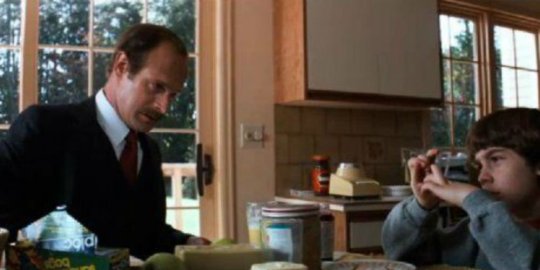
Much of Bastian's troubles in the movie stem from him having to cope with the loss of his mother. He has nightmares, struggles at school and isn't even interested in the riding lessons he had desperately wanted. Instead of helping him process these strong feelings and being there for his son, Bastian's dad tells him that he can't let the loss of his mother keep him "from getting the old job done," as if they'd lost a goldfish instead of his own wife.
Granted, modern dads are much more woke when it comes to parenting, but this is so cruel and callous that we almost expect him to appear as a villain later in Fantasia, a la Jason Isaacs' performance as both Mr. Darling and Hook in Peter Pan.
7 The Entire Thing Is A Swamp Of Sadness
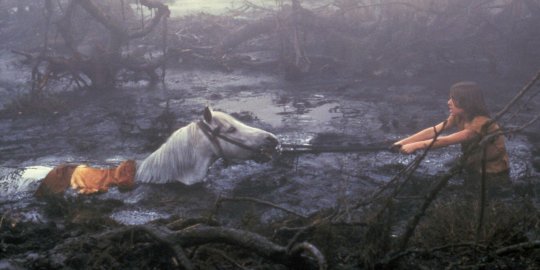
Most kids' movies are filled with laughter, vibrant colors and engaging material. There may be some depressing moments, but they are few and far between. Not so for this one! Most of the movie is dark, depressing and slow as the audience rumbles through one loss after another, witnessing the land's leading brain give up because "nothing matters" and everyone from Artax to most of the characters we've met succumb to the Nothing.
RELATED: 10 Books That Are Still Better Than The Movie
As adults watching The Neverending Story, we have to wonder how we made it through the film without crawling under a blanket fort and hiding for a week afterward. It's that depressing.
6 Bastion Escapes In The School Attic
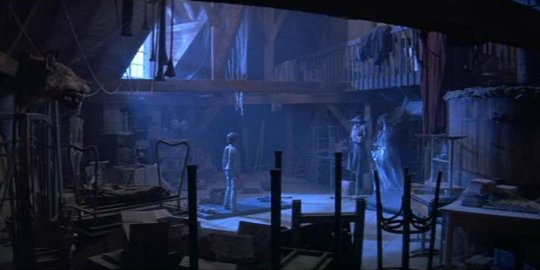
It's already pretty messed up that Bastian skips class just to avoid a math test, but instead of leaving the building and finding a more familiar spot to cut classes at like a normal kid, Bastian grabs the key to the school attic and hides in there. How does he even know to do this? Why would the attic of the place he's actually avoiding even come to mind as a decent hideout?
Then there is the attic itself, which is full of a bunch of weird, creepy stuff to begin with. It's much more like the attic of someone's creepy grandpa who used to hunt wolves than a room that belongs in a school.
5 Characters Give Up And Off Themselves
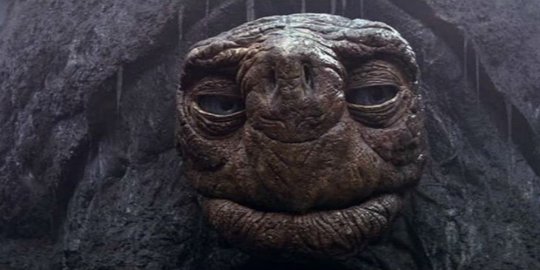
In an existential theme that is way too dark and deep for a kids' movie, the characters we have nostalgia for are so much darker than we recall. Morla's funny sneezing distracted us from the fact that the giant turtle had given up on life and welcomed the end of Fantasia. It didn't even care whether or not it cared.
RELATED: 10 Dungeons & Dragons Campaigns That Would Make Great Movies
Then there's Artax, who simply abandoned his will to live in the Swamps of Sadness. He had no injuries, no illness; just a deep pit of despair that he succumbed to, leaving plenty of analogies to be made about mental illness, depression and one's demise on their own terms. This is completely out of place in a children's fantasy.
4 Atreyu's Confrontation With Gmork Is Over In Seconds

What should have been the climax of the movie is not only anticlimactic, but it's over in seconds, negating all of that beautiful tension it built throughout the film. Gmork is on Atrey's tail so closely that he almost nabs him in the Swamps of Sadness before Falkor sweeps in and saves the day, and there are several moments where it cuts to the servant of the Nothing to demonstrate what a terrible threat he truly is. Those green eyes! That scary maw!
It was all for naught. The final battle had a bit of a monologue/question-and-answer session, followed by a single leap and a knife to the creature's gut. That's it. As kids, this terrified many, but as adults, we can't help but wonder if they just ran out of time.
3 It Breaks Rules We Have Today

While it makes sense that rules and regulations evolve over time, some of the societal rules that The Neverending Story breaks are weird--and one of them even makes less sense today. The Southern Oracle shows a bit of female anatomy in a children's movie that is edited from everything from movies to Facebook today, and most people find it ridiculous. After all, the same piece of skin on male anatomy isn't edited, and it is only skin.
RELATED: The Dark Crystal: Age of Resistance - 10 Things To Know About The Upcoming Netflix Series
Bastian's father also drinks a raw egg from a glass, which may have once been considered a healthy start to one's morning but is now regarded as practically summoning salmonella into one's body. Kids aren't even encouraged to eat cookie dough with raw eggs anymore.
2 Bastian's Name Makes No Sense
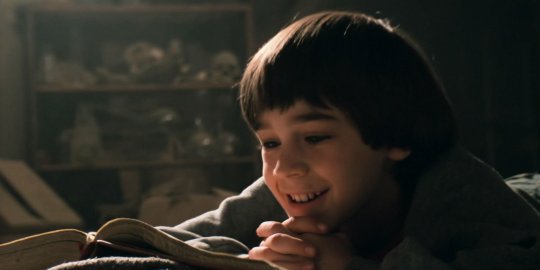
At the Southern Oracle, we learn that the Empress needs a new name, and that it can only be given by an Earthling child. It's a dead giveaway, but Bastian is oblivious and mutters about how he could give her a wonderful name: the name of his mother. It's definitely implied that if he were to name her, he would give the empress his mother's name.
When the time comes, he instead calls out "Moonchild!" in a storm, making it super hard to understand not only because of the way it's said, but why it was chosen. Was his mom really named Moonchild? If not, why rename "the Childlike Empress" a name like "Moonchild," which only makes her seem even less powerful?
1 The Big Finale Isn't Big, Or A Finale
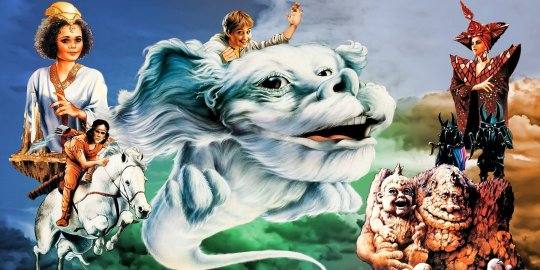
In an epic fantasy, fans want to be wowed by some major discovery by the end of the work. The more magical it is, the better. That's why the big finale, which revealed that the power was in Bastian all along, was a total letdown.
It was cool for kids to see another kid with the power, but realizing that he could've used it all along to save us from the harrowing moments mentioned above is sort of traumatic. Add to that the fact that Bastian called out a name none of us could even understand in what should've been a big moment, or the fact that he'd have many more adventures, "but that's another story," and it doesn't even feel like a conclusion.
NEXT: 10 Pre-Lord Of The Rings High-Fantasy Movies That Are Still Worth Watching
source https://screenrant.com/neverending-story-sense-plot-holes/
0 notes
Text
Ten Interesting German Novels
The End of Days By Jenny Erpenbeck
“ Winner of the Independent Foreign Fiction Prize and the Hans Fallada Prize, The End of Days, by the acclaimed German writer Jenny Erpenbeck, consists essentially of five “books,” each leading to a different death of the same unnamed female protagonist. How could it all have gone differently?―the narrator asks in the intermezzos. The first chapter begins with the death of a baby in the early twentieth-century Hapsburg Empire. In the next chapter, the same girl grows up in Vienna after World War I, but a pact she makes with a young man leads to a second death. In the next scenario, she survives adolescence and moves to Russia with her husband. Both are dedicated Communists, yet our heroine ends up in a labor camp. But her fate does not end there…. “ (Amazon)
Momo By Michael Ende
“ In the ruins of an amphitheatre just outside an unnamed city lives Momo, a little girl of mysterious origin. She came to the ruin, parentless and wearing a long, used coat. She is illiterate and cannot count, and she doesn't know how old she is. When asked, she replies, "As far as I remember, I've always been around." She is remarkable in the neighbourhood because she has the extraordinary ability to listen—really listen. By simply being with people and listening to them, she can help them find answers to their problems, make up with each other, and think of fun games. The advice given to people "go and see Momo!" has become a household phrase and Momo makes many friends, especially an honest, silent street-cleaner, Beppo, and a poetic, extroverted tour guide, Gigi (Guido in some translations).” (Wikipedia)
The Neverending Story by Michael Ende
“ The book centers on a boy, Bastian Balthazar Bux, a small and strange child who is neglected by his father after the death of Bastian's mother. While escaping from some bullies, Bastian bursts into the antique book store of Carl Conrad Coreander, where he finds his interest held by a book called The Neverending Story. Unable to resist, he steals the book and hides in his school's attic, where he begins to read. “ (Wikipedia)
The Magic Mountain By Thomas Mann
“ In this dizzyingly rich novel of ideas, Mann uses a sanatorium in the Swiss Alps--a community devoted exclusively to sickness--as a microcosm for Europe, which in the years before 1914 was already exhibiting the first symptoms of its own terminal irrationality. The Magic Mountain is a monumental work of erudition and irony, sexual tension and intellectual ferment, a book that pulses with life in the midst of death. “ (Amazon)
Death in Venice by Thomas Mann
“ One of the most famous literary works of the 20th century, the novella "Death in Venice" embodies themes that preoccupied Thomas Mann (1875–1955) in much of his work; the duality of art and life, the presence of death and disintegration in the midst of existence, the connection between love and suffering, and the conflict between the artist and his inner self. Mann's handling of these concerns in this story of a middle-aged German writer, torn by his passion for a Polish youth met on holiday in Venice, resulted in a work of great psychological intensity and tragic power. It is presented here in an excellent new translation with extensive commentary on many facets of the story. “ (Amazon)
Steppenwolf by Hermann Hesse
“ Harry Haller is a sad and lonely figure, a reclusive intellectual for whom life holds no joy. He struggles to reconcile the wild primeval wolf and the rational man within himself without surrendering to the bourgeois values he despises. His life changes dramatically when he meets a woman who is his opposite, the carefree and elusive Hermine. The tale of the Steppenwolf culminates in the surreal Magic Theater-For Madmen Only!
Originally published in English in 1929, Steppenwolf's wisdom continues to speak to our souls and marks it as a classic of modern literature. “ (Amazon)
The Tin Drum by Günter Grass
“ On his third birthday Oskar decides to stop growing. Haunted by the deaths of his parents and wielding his tin drum Oskar recounts the events of his extraordinary life; from the long nightmare of the Nazi era to his anarchic adventures in post-war Germany. “ (goodreads)
The City of Dreaming Books by Walter Moers
“In this new Zamonian adventure, Optimus Yarnspinner, a young writer, inherits from his beloved godfather an unpublished short story by an unknown author.The search for the author’s identity takes Yarnspinner to Bookholm―the so-called City of Dreaming Books. On entering its streets, our hero feels as if he has opened the door of a gigantic second-hand bookshop. His nostrils are assailed by clouds of book dust, the stimulating scent of ancient leather, and the tang of printer’s ink. Soon, though, Yarnspinner falls into the clutches of the city's evil genius, Pfistomel Smyke, who treacherously maroons him in the labyrinthine catacombs underneath the city, where reading books can be genuinely dangerous. In The City of Dreaming Books, Walter Moers transports us to a magical world where reading is a remarkable adventure. Only those intrepid souls who are prepared to join Yarnspinner on his perilous journey should read this book. We wish the rest of you a long, safe, unutterably dull and boring life!” (Amazon)
Berlin Alexanderplatz by Alfred Döblin
“ The story concerns a murderer, Franz Biberkopf, fresh from prison. When his criminal mentor murders the prostitute on whom Biberkopf has been relying as an anchor, he realizes that he will be unable to extricate himself from the underworld into which he has sunk. He must deal with misery, lack of opportunities, crime and the imminent ascendency of Nazism. During his struggle to survive against all odds, life rewards him with an unsuspected surprise but his happiness will not last as the story continues. “ (Wikipedia)
Night Train to Lisbon by Pascal Mercier
“ Raimund Gregorius teaches classical languages at a Swiss lycée, and lives a life governed by routine. One day, a chance encounter with a Portuguese woman inspires him to question his life—and leads him to an extraordinary book that will open the possibility of changing it. Inspired by the words of Amadeu de Prado, a doctor whose intelligence and magnetism left a mark on everyone who met him and whose principles led him into a confrontation with Salazar’s dictatorship, Gergorius boards a train to Lisbon. As Gregorius becomes fascinated with unlocking the mystery of who Prado was, an extraordinary tale unfolds. “ (Amazon)
1 note
·
View note
Text
I’ve reached “A Journey in the Dark,” and am thinking on the scene where they discuss the worth of the mithril shirt, not knowing Frodo wears it. What Frodo bears upon his back is the price of the Shire.
26 notes
·
View notes
Text
Yesterday was the last Humanities class of the semester, and I am rather sad. No more Bffwulf. I really think this was the best Humanities class I ever ran for this tiny little school - the Iliad and the Odyssey went well in previous years, but something about the group i had this year just clicked. They really approached it wholeheartedly. Yesterday I asked them what they would remember about studying Beowulf, and it did my heart good to hear: the day we did skits using only the word-for-word passages from the tale, the new adventure we invented for Beowulf through communal storytelling, the thoughtful discussion we had about whether Beowulf is a Pagan or Christian work, and how worldview works in literature. Honestly, I am so grateful, because ti really is the students who make or break a course, and they were magnificent.
17 notes
·
View notes
Text
Areas in which I want to buff up my reading in 2024
Non-fiction - most especially I want to indulge in some factual works that don't relate to classes I am teaching. But also I'd love to read a couple of full books relating to niche areas of what my students are studying, so I can beguile them with awesomeness that doesn't show up in more general works.
Spiritual works. This year I did significantly better at keeping up with scriptural reading and the odd spiritual work, but I would like to strengthen this area.
Literary classics. These featured semi-regularly in my reading this year, but I tend to pick ones I find easy to get into, like Greek tragedy or nineteenth century girls' classics. I'd like to pick at least one or two classics that I really have to push myself to get into, however. I used to have much more stamina for this kind of thing (classics constituted the bulk of my reading in my teens and early twenties!), and it was very rewarding upon a time. Gained some favourite books from it. This is an important step in the recovering reader process. I just have to find some great literary classics that appeal to me but also daunt me.
Re-reads. I think it would do me good to make more of a point of revisiting some old, well-loved works. I used to be such a re-reader, but I haven't done nearly as much of it since I began my recovering reader project.
Works in Latin and French. I studied both in my younger years, and let them grow rust-ish. I want to sit down with some translated children's books I am already familiar with in English, and respective dictionaries, and see what comes of it. (I'm already in progress of reading "Familia Romana," but that doesn't count.)
Original works by my talented writer friends
And of course, more, more, more fantasy, works for children and young people, historicals, and plays! I don't need to make any concerted effort for those, but I want even more!
24 notes
·
View notes
Text
“No animal, according to the rules of animal-etiquette, is ever expected to do anything strenuous, or heroic, or even moderately active during the off-season of winter.”
― Kenneth Grahame, The Wind in the Willows
21 notes
·
View notes
Text
When I was a kid my dad was ridiculously eager to get me reading Tolkien ASAP, and apparently asked my mom through my preschool years, "Do you think she's old enough? Maybe this year?" As a result of my extreme youth when he read them to me, I had some weird first impressions and imaginings, most notably that I was under the impression that Gollum was a glob of pink goo (neon pink in my imagination) with glowing yellow snail eyes, and that Tom Bombadil looked exactly like Barliman Butterbur, but had a yo-yo which he constantly bounced to the rhythm of his songs.
Don't ask me how I got these impressions.
21 notes
·
View notes
Text
I got my dad reading The Queen's Thief books, and he is actually writing his thoughts on each chapter down in a notebook, inventing Socratic questions about the text and analyzing the characters! He's partway through the second book, and I can see he's really appreciating it!
87 notes
·
View notes
Text
Oh wow - I REALLY like StoryGraph compared to GoodReads! It has all the same features, plus some more that are useful to me. It even has a feature that lets you import all your GoodReads data, shelves, etc, which I haven’t tried yet, but could make it less daunting for anyone who wants to get away from Amazon.
22 notes
·
View notes
Text
Brandon Sanderson, you absolute nut (affectionate.)
15 notes
·
View notes
Text
THE POET: Let me explain. I have reached a crisis. I have reached what we, in a world somewhat different from your own simple round of duties, describe as the creative crisis. It may be described as the crisis at which you want to create something and can't. In most distinguished artists it lasts for a lifetime. It is then called the artistic temperament. But something tells me tonight that I am very near to turning the corner. There are four notes that I can almost hear, but cannot yet name or number, that lift the last line of the song suddenly into heaven. Or at least they will, when I know what they are...
- "The Surprise," G. K. Chesterton
32 notes
·
View notes